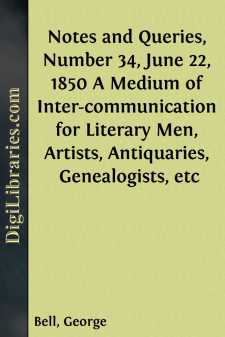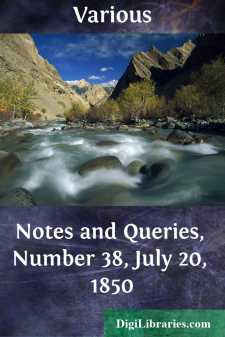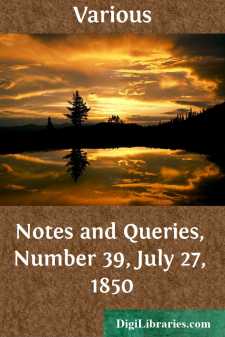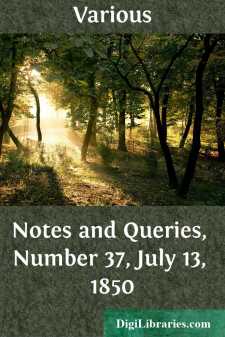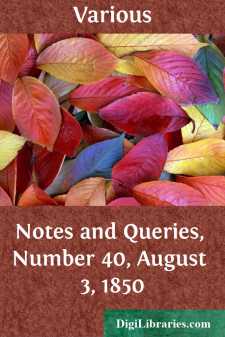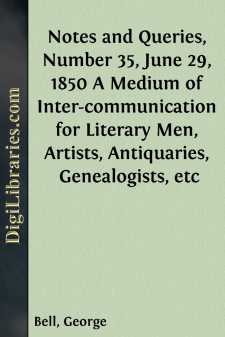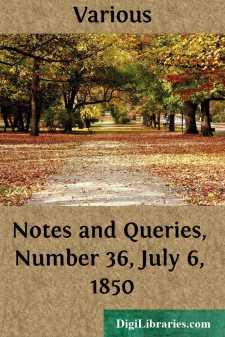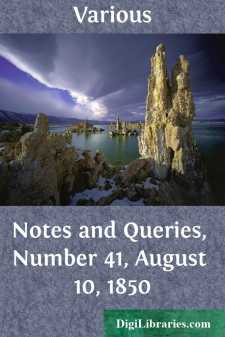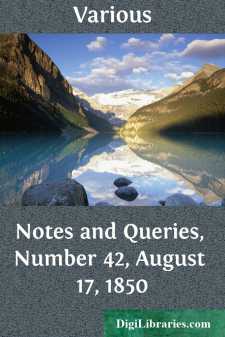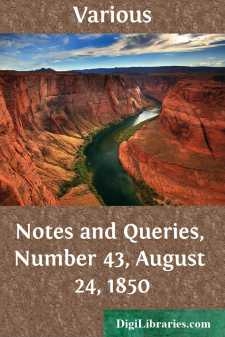Periodicals
- Art 27
- Children's periodicals 59
- Entertainment 5
- Food/Wine 2
- Games/Humor 455
- General
- Health 1
- History 53
- House/Home 1
- Regional 62
- Science/Nature 118
- Transportation 10
General Books
Sort by:
by:
George Bell
THE "AGAPEMONE" OF THE SIXTEENTH CENTURY. As it is not generally known that the "Agapemone" had a prototype in the celebrated Family of Love, some account of this "wicked sect" may not at this moment be without interest to your readers:— "Henry Nicholas, a Westphalian, born at Munster, but who had lived a great while at Amsterdam, and some time likewise at Embden, was the...
more...
by:
Various
NOTES. WHAT IS THE MEANING OF "DELIGHTED," AS SOMETIMES USED BY SHAKSPEARE. I wish to call attention to the peculiar use of a word, or rather to a peculiar word, in Shakspeare, which I do not recollect to have met with in any other writer. I say a "peculiar word," because, although the verb To delight is well known, and of general use, the word, the same in form, to which I refer, is...
more...
by:
Various
NOTES. ETYMOLOGY OF "WHITSUNTIDE" AND "MASS". Perhaps the following Note and Query on the much-disputed origin of the word Whitsunday, as used in our Liturgy, may find a place in your Journal. None of the etymologies of this word at present in vogue is at all satisfactory. They are— I. White Sunday: and this, either— 1. From the garments of white linen, in which those who were at...
more...
by:
Various
NOTES THE AUTHOR OF THE "CHARACTERISTICS." Lord Shaftesbury's Letters to a young Man at the University, on which Mr. SINGER has addressed to you an interesting communication (Vol. ii., p. 33.), were reprinted in 1746 in a collection of his letters, "Letters of the Earl of Shaftesbury, author of the Characteristicks, collected into one volume: printed MDCCXLVI." 18mo. This volume...
more...
by:
Various
NOTES. TRANSLATIONS OF JUVENAL—WORDSWORTH. Mr. Markland's ascertainment (Vol. i., p. 481.) of the origin of Johnson's "From China to Peru," where, however, I sincerely believe our great moralist intended not so much to borrow the phrase as to profit by its temporary notoriety and popularity, reminds me of a conversation, many years since, with the late William Wordsworth, at which I...
more...
by:
George Bell
GEORGE GORING, EARL OF NORWICH, AND HIS SON GEORGE, LORD GORING. G.'s inquiry (Vol. i., p. 22.) about the two Gorings of the Civil War—a period of our history in which I am much interested—has led me to look into some of the sources of original information for that time, in the hope that I might be enabled to answer his Queries. I regret I cannot yet answer his precise questions, when Lord...
more...
by:
Various
NOTES FURTHER NOTES ON DERIVATION OF THE WORD "NEWS". Without being what the Germans would call a purist, I cannot deem it an object of secondary importance to defend the principles of the law and constitution of the English language. For the adoption of words we have no rule; and we act just as our convenience or necessity dictates: but in their formation we must strictly conform to the laws...
more...
by:
Various
NOTES. SIR WILLIAM GASCOIGNE. Although you and I no doubt unite in the admiration, which all our fellow-countrymen profess, and some of them feel, for our immortal bard, yet I do not think that our zeal as Shakspearians will extend so far as to receive him as an unquestionable authority for the facts introduced into his historical plays. The utmost, I apprehend, that we should admit is, that they...
more...
by:
Various
NOTES ALFRED'S OROSIUS. The two exceedingly valuable elucidations which the geography of King Alfred relating to Germany (intercalated in the royal author's translation of Orosius), has received from your learned contributors MR. R.T. HAMPSON (Vol. i., p. 257.) and MR. S.W. SINGER (Vol. i., p. 313.) induce me to offer some new views on the same subject. From my having passed a long series of...
more...
by:
Various
NOTES NOTES AND QUERIES The history of books and periodicals of a similar character ought to be the object of interest to the readers of this work. The number of works in which answers have been given to proposed questions is not small. Not to mention the Spectator and its imitators, nor the class of almanacs which give riddles and problems, nor mathematical periodicals of a more extensive...
more...


